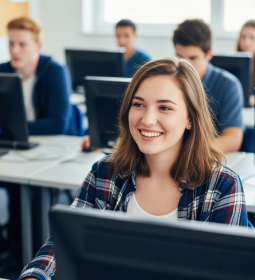Studying is not an easy thing. We know that it is influenced by the abilities, motivation, support of family and teachers. All this is logical and understandable. But it turns out that there are also factors that first make you smile, and then think seriously. Here is a selection of amazing scientific findings about what helps you learn.
Trees outside the window: nature and productivity
Imagine: two classes, some children looking at trees, others at gray walls. Researchers have found that the former have less aggression and hyperactivity, and academic success is better.
If you are an adult and think that a walk in the park is a waste of time, then in vain: after 40 minutes in the green zone, the concentration increases. But walking among the buildings, such an effect cannot be achieved. Nature really helps our brains reboot.

Clean Air: An Invisible Helper
It turns out that even air affects academic performance. Finnish scientists have found that the results of final exams in mathematics are worse in schools, where the level of fine particulate pollution was increased on exam days.
The heat is the enemy of good grades. For example, in the spring, students in Oklahoma performed worse on math tests if it was too hot outside. But in autumn, the same heat is perceived more calmly - we got used to it after summer.
Not too high ceilings
Australian students who took exams in halls with ceilings higher than 9 meters showed worse results. What's the matter? Perhaps everything is spoiled by poor lighting, stuffiness or a large number of people around.
Proximity to school at home
Italian researchers have found that the less time a student spends on the road to university, the higher his success. If you live a stone's throw from the university, congratulations! But long trips are exhausting and take away energy that could go to study.
Change of scenery: remembering better

Californian psychologists have proven that learning material in different places is more useful. Why? It's simple: the environment creates associations that help you remember what you have learned.
Sport = Intelligence
Forgot about physical education? In vain. Studies have shown that active children do better. Sport develops self-control, working memory and other skills that are important not only in the classroom, but also in life.
Proper breakfast is the key to success
Australian schoolchildren who eat breakfast regularly show better results. And if breakfast is rich in fruits, proteins and whole grains, then the motivation to study grows.
Pets are the best listeners
Israeli schoolchildren who read aloud to dogs improved their reading skills faster. Dogs do not criticize, do not interrupt and listen attentively. Perfect helpers!

Four to six friends for success
Chinese scientists have found that the optimal number of close friends is 4-6. Less is boring and lonely, more can be too many distractions.
Board games for the brain
Do you play board games? It's cool! They help develop writing, arithmetic, and memory skills, especially if they require reading, counting, or making quick decisions.

Teacher, straighten up!
German studies have proven that the teacher's posture affects the perception of students. A straight back and an open posture – students are engaged. Slouching or "closed" gestures – and the lecture becomes boring.
Teacher's voice and speech
Do you like lecturers with low voices? Or tall? It is important that the timbre is memorable. And, by the way, too slow speech reduces the interest of students.
What does it all mean?
Almost everything affects academic success: from the trees outside your window to your breakfast. Small changes can improve grades and the overall quality of life. If you want to combine the benefits of a supportive learning environment with exposure to global education standards, considering a secondary education in the United Kingdom is a great choice. British schools emphasize critical thinking, creativity, and personal development, giving students the foundation to succeed academically and personally.
Start with a walk in the park… and maybe a straight back!








